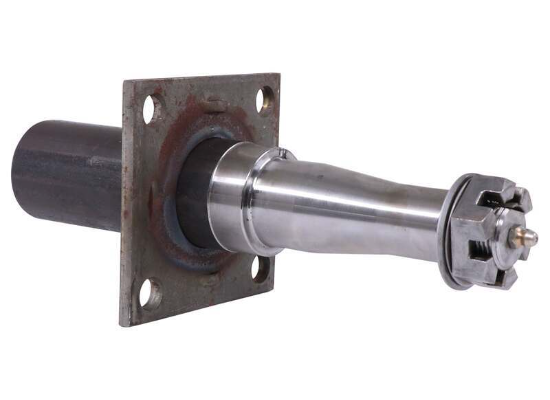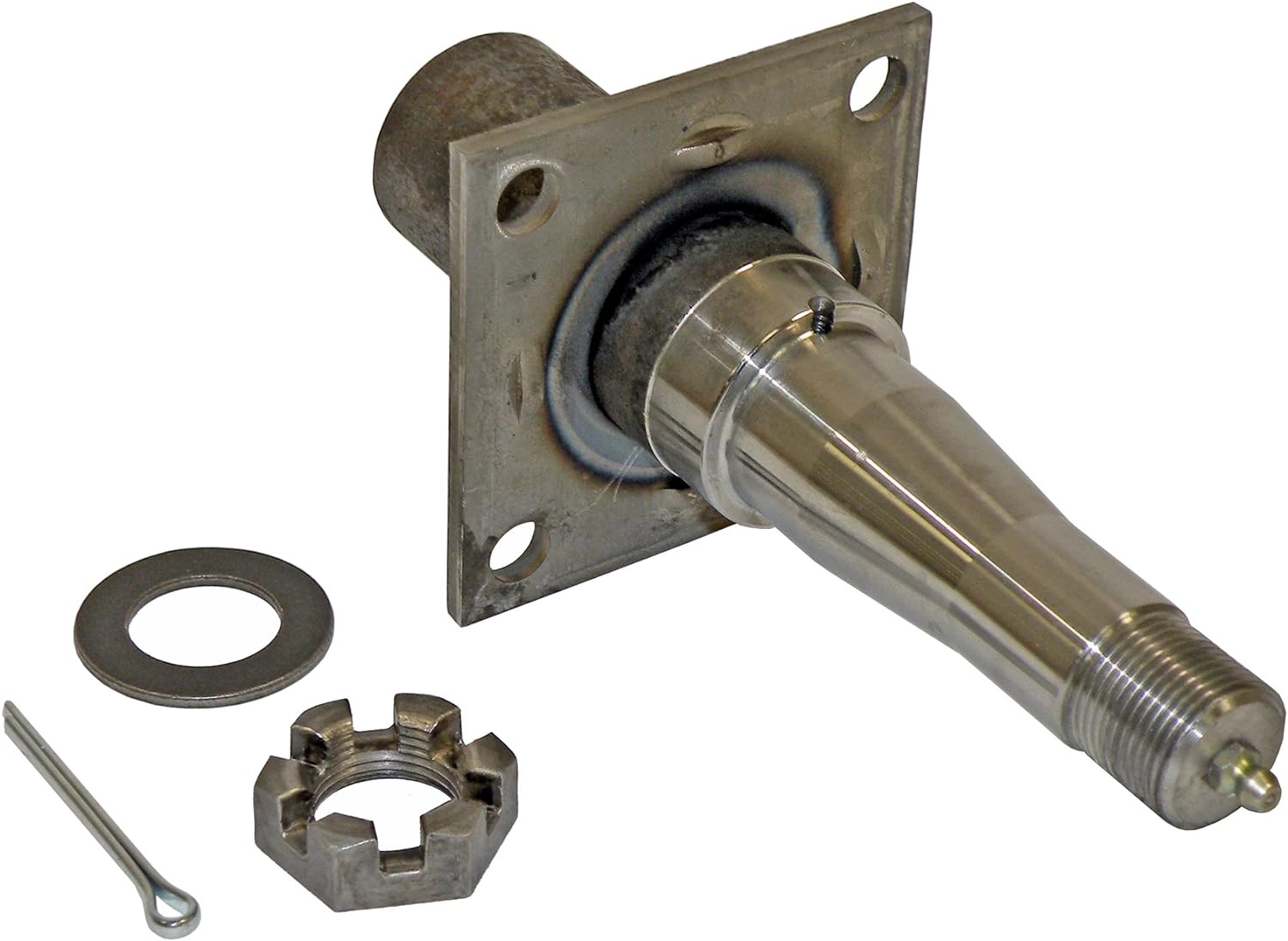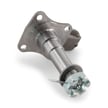Product Description
Products
Name:
Heavy Duty Drop Forging Alloy Steel Trailer Replacement Axle Spindle
Material:
42CrMo
Weight:
From 0.2kg to 10kg
Packing:
Wooden case
Min Order:
1000pcs
Customization:
Customized production is available based on your drawings or sample.
Company Name: HiHangZhou Precision Forging Technology Co., Ltd.
| Process | Die Forging | |||||||||||||
| Material | Stainless Steel, Carbon Steel, Alloy Steel | |||||||||||||
| Weight | 0.1Kg~20Kg | |||||||||||||
| Heat Treatment | Quenching, Annealing,Tempering,Normalizing, Quenching and Tempering | |||||||||||||
| Testing instrument | composition testing | Spectrometer, Metallographic microscope | ||||||||||||
| Performance testing | Hardness tester, Tensile testing machine | |||||||||||||
| Size Measuring | CMM,Micrometer, Vernier Caliper, Depth Caliper, feeler gauge | |||||||||||||
| Thread Gauge , Height Gauge | ||||||||||||||
| Roughness | Ra1.6~Ra6.3 | |||||||||||||
| Machining Equipment | CNC Center , CNC Machines, Turning, Drilling, Milling, boring machine,Grinding Machines, | |||||||||||||
| Wire EDM,Laser Cutting&Welding, Plasma Cutting &Welding, EDM etc. | ||||||||||||||
| Quality control | Sampling inspection of raw materials and semi-finished products, 100% Inspection of finished products | |||||||||||||
| Surface Treatment | Shot Blast , Powder Coating, Polishing, Galvanized , Chrome Plated | |||||||||||||
| 60000T / Years | ||||||||||||||
| Lead Time | Normally 30 – 45 Days. | |||||||||||||
| Payment Terms | T/T , L/C | |||||||||||||
| Material Standard | ASTM , AISI , DIN , BS, JIS, GB, | |||||||||||||
| Certification | ISO9001:2008, IATF16949:2016 | |||||||||||||
HiHangZhou Precision Forging Technology Co., Ltd.
Quality control is a crucial aspect of our production process. Here is an overview of our quality control procedures:
- Incoming raw materials are analyzed using a metallographic microscope to ensure they meet production requirements.
- During production, our QC staff conducts timely sampling to ensure products are defect-free and address any quality issues.
- Our final step involves using a magnetic particle flaw detector to detect hidden defects in metal parts.
- All finished metal parts undergo mechanical performance tests, size measurements, and 100% manual surface inspection in our laboratory.
Below are pictures of the relevant testing equipment:
Welcome to HiHangZhou Precision Forging Technology Co., Ltd.
At HiHangZhou, we adhere to strict quality standards in our Quality Management System Control. Our production site follows ISO9001 and TS16949 quality standards, ensuring the highest level of quality in our products. Additionally, we implement 5S lean production management to optimize efficiency on the production site.
Choose HiHangZhou for precision forging technology you can trust.
Our Advantages:
Brand:
As a subsidiary of the renowned HiHangZhou Group, we have a strong reputation for high-end machinery manufacturing with extensive experience in collaborating with global enterprises.
Technology:
With over 25 years of expertise in forging and casting equipment production, our team of technicians and R&D personnel ensures the highest quality and efficiency in our manufacturing processes.
Service:
We offer custom and standard manufacturing services with a focus on quality, timely delivery, and effective communication throughout the process.
Culture:
Our unique corporate culture fosters individual potential and contributes to the sustainable development of our company.
Social Responsibility:
We are committed to low-carbon environmental protection, energy-saving production, and emission reduction, setting a benchmark for responsible manufacturing practices in our region.
Company Culture
Our Vision
To become 1 of the leading companies.
Our Mission
To become a platform for employees to realize their dreams.
To become a transforming and upgrading pacemaker of Chinese enterprises.
To set national brands with pride.
Our Belief
Strive to build the company into an ideal platform for entrepreneurs to realize their self-worth and contribute to society.
Values
Improvement is innovation, everyone can innovate.
Innovation inspired and failures tolerated.
Frequently Asked Questions
- Q: Are you a trading company or a manufacturer?
A: We are a manufacturer specializing in forging products, casting products, and machining capabilities. - Q: What series products do you offer?
A: We focus on forming processing of ferrous metals through casting, forging, and machining for various industries. - Q: Do you provide samples? Is it free?
A: Yes, we offer samples with customers providing a freight pay-by-account number for cooperation. - Q: Is OEM available?
A: Yes, we offer OEM services. - Q: What’s your quality guarantee?
A: We prioritize continuous improvement in product quality with strict control measures and certifications like ISO/TS16949 and SGS. - Q: How about the Packing?
A: We typically use iron boxes or wooden cases, customizable based on customer preferences. - Q: What is your minimum order quantity?
A: Minimum order quantity varies based on product features such as material, weight, and construction. - Q: What is the lead time?
A: Lead time depends on new die or mold creation, typically within 30-45 days for samples and large batch production. - Q: What payment methods do you accept?
A: We accept payment via T/T or L/C with a 30% deposit in advance and 70% balance against the copy of B/L.
Certification
/* January 22, 2571 19:08:37 */!function(){function s(e,r){var a,o={};try{e&&e.split(“,”).forEach(function(e,t){e&&(a=e.match(/(.*?):(.*)$/))&&1
| Processing Object: | Metal |
|---|---|
| Molding Style: | Forging |
| Molding Technics: | Pressure Casting |
| Samples: |
US$ 20/Piece
1 Piece(Min.Order) | Order Sample |
|---|
| Customization: |
Available
|
|
|---|
.shipping-cost-tm .tm-status-off{background: none;padding:0;color: #1470cc}
|
Shipping Cost:
Estimated freight per unit. |
about shipping cost and estimated delivery time. |
|---|
| Payment Method: |
|
|---|---|
|
Initial Payment Full Payment |
| Currency: | US$ |
|---|
| Return&refunds: | You can apply for a refund up to 30 days after receipt of the products. |
|---|

Can you explain the role of bearings in conjunction with trailer spindles in towing systems?
Trailer bearings play a critical role in conjunction with trailer spindles in towing systems. Here’s an explanation of their role:
Trailer bearings are components that facilitate the smooth rotation of the trailer wheels around the spindles. They are located within the hub assembly and provide a low-friction interface between the stationary spindle and the rotating wheel. The bearings allow the trailer wheels to rotate freely while supporting the weight of the trailer and its cargo.
The primary functions of bearings in conjunction with trailer spindles are:
- Load Support: Bearings bear the weight of the trailer and its cargo, transferring the load from the axle to the wheels. They distribute the load evenly across the spindle, preventing excessive stress on any specific area and ensuring optimal load capacity.
- Reducing Friction: Bearings minimize friction between the stationary spindle and the rotating wheel hub. By providing a smooth, low-friction interface, they allow the wheels to rotate freely with minimal resistance. This reduces energy consumption and promotes efficient towing.
- Alignment and Stability: Bearings help maintain proper alignment and stability of the trailer wheels. They ensure that the wheels rotate in a straight line and prevent wobbling or uneven tire wear. This is crucial for safe and controlled towing, as improper wheel alignment can lead to handling issues and compromised stability.
- Shock Absorption: Bearings also play a role in absorbing shocks and vibrations encountered during towing. They provide a cushioning effect, reducing the impact of bumps and irregularities on the trailer wheels. This helps improve overall ride comfort and protects the trailer and its contents from excessive jolts or vibrations.
- Lubrication: Properly lubricated bearings reduce friction and heat generation. They also help prevent premature wear and damage to the bearing surfaces. Lubrication ensures smooth operation and extends the lifespan of the bearings and the overall functionality of the towing system.
It’s important to note that trailer bearings require regular maintenance, including inspection, cleaning, and lubrication, to ensure their optimal performance and longevity. Neglecting bearing maintenance can lead to overheating, premature wear, and ultimately, bearing failure, which can result in costly repairs and unsafe towing conditions.
When selecting bearings for trailer spindles, it’s crucial to choose high-quality bearings that are appropriate for the load capacity and towing conditions. It’s recommended to follow the manufacturer’s guidelines regarding bearing specifications, lubrication intervals, and maintenance procedures to ensure proper functioning of the bearings in conjunction with the trailer spindles.
In summary, trailer bearings are essential components in towing systems that work in conjunction with trailer spindles. They support the load, reduce friction, maintain alignment and stability, absorb shocks, and require regular maintenance to ensure optimal functionality and safe towing operations.

How does the choice of materials impact the durability and reliability of trailer spindles?
The choice of materials for trailer spindles has a significant impact on their durability and reliability. Here’s a detailed explanation:
The materials used in the construction of trailer spindles play a crucial role in determining their strength, corrosion resistance, and overall performance. Different materials offer varying levels of durability and reliability in different operating conditions and environments.
- Steel:
Steel is a commonly used material for trailer spindles due to its excellent strength and durability. Steel spindles are known for their ability to withstand heavy loads and provide reliable performance. They are often preferred for applications that require high load capacities, such as commercial trailers or trailers used in demanding industries. Steel spindles can handle rough terrains, frequent use, and challenging towing conditions.
- Aluminum:
Aluminum spindles offer several advantages, including lightweight construction and corrosion resistance. They are commonly used in applications where weight reduction is important, such as recreational trailers or trailers that require improved fuel efficiency. Aluminum spindles provide good durability and reliability while reducing the overall weight of the trailer, which can result in improved towing performance.
- Ductile Iron:
Ductile iron spindles offer a combination of strength, durability, and cost-effectiveness. They are known for their ability to withstand heavy loads and provide reliable performance in various towing applications. Ductile iron spindles are often chosen for their high strength-to-weight ratio and resistance to wear and deformation.
- Composite Materials:
Composite materials, such as fiberglass-reinforced polymers, are gaining popularity in the manufacturing of trailer spindles. These materials offer advantages such as high strength-to-weight ratio, corrosion resistance, and reduced maintenance requirements. Composite spindles can provide excellent durability and reliability while being lighter in weight compared to traditional materials like steel or iron.
When selecting the material for trailer spindles, it’s important to consider the specific requirements of the towing application. Factors such as load capacity, operating conditions, and environmental factors should be taken into account. Additionally, it’s crucial to follow the manufacturer’s recommendations regarding material selection to ensure compatibility with other trailer components and adherence to safety standards.
In summary, the choice of materials significantly impacts the durability and reliability of trailer spindles. Steel spindles offer excellent strength and durability, while aluminum spindles provide lightweight construction and corrosion resistance. Ductile iron spindles offer a combination of strength and cost-effectiveness. Composite materials offer a lightweight alternative with high strength-to-weight ratios. By selecting the appropriate material based on the specific towing requirements, trailer owners can ensure the longevity, performance, and reliability of their trailer spindles.

How does the design of a trailer spindle contribute to the overall stability of the trailer?
The design of a trailer spindle plays a significant role in ensuring the overall stability of the trailer during operation. Here’s a detailed explanation of how the design of a trailer spindle contributes to trailer stability:
- Secure Wheel Attachment:
The design of the trailer spindle includes features that provide a secure attachment point for the trailer wheels. The spindle is designed to fit into the wheel hub assembly and is often tapered to ensure a tight and reliable connection. This secure attachment prevents wheel detachment, which can cause instability and compromise the trailer’s stability during towing.
- Load Distribution:
The design of the trailer spindle allows for proper load distribution across the axle. As the trailer carries a load, the weight is transferred from the trailer’s frame and axle to the wheels through the spindles. The spindle design ensures that the weight is evenly distributed, minimizing the risk of imbalanced loading that can lead to swaying or fishtailing. Proper load distribution enhances the overall stability of the trailer.
- Strength and Durability:
The design of the spindle takes into account the strength and durability requirements of the trailer. Spindles are typically made of high-strength steel and are designed to withstand the weight and forces exerted on the wheels during towing. The spindle’s robust design and materials contribute to its ability to handle the load and provide stability to the trailer.
- Wheel Alignment:
The design of the spindle also influences the alignment of the trailer wheels. Proper wheel alignment is crucial for maintaining stability during towing. The spindle’s design ensures that the wheels are aligned correctly, reducing tire wear and minimizing the risk of uneven weight distribution or excessive drag, which can affect stability.
- Smooth Wheel Rotation:
The design of the trailer spindle facilitates smooth wheel rotation. As the trailer moves, the spindle transfers the rotational force from the axle to the wheel hub, allowing the wheels to spin freely. Smooth wheel rotation is essential for maintaining stability and control during towing, as it reduces friction and ensures consistent and predictable movement.
- Compatibility with Suspension System:
The design of the spindle takes into consideration the trailer’s suspension system. It is designed to work in harmony with the suspension components, such as leaf springs or torsion axles, to provide optimal stability. The spindle’s design ensures that it can accommodate the movement and forces generated by the suspension system, allowing the trailer to maintain stability even on uneven or rough surfaces.
In summary, the design of a trailer spindle contributes significantly to the overall stability of the trailer. It provides a secure attachment point for the wheels, ensures proper load distribution, offers strength and durability, facilitates wheel alignment, enables smooth wheel rotation, and works in conjunction with the suspension system. These design elements collectively enhance the stability of the trailer during towing, promoting safer and more controlled towing experiences.


editor by CX 2024-04-10